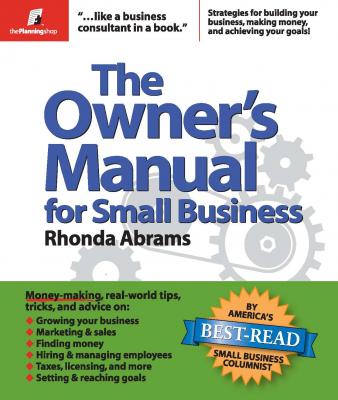The Owner's Manual for Small Business. Rhonda Abrams
Читать онлайн.| Название | The Owner's Manual for Small Business |
|---|---|
| Автор произведения | Rhonda Abrams |
| Жанр | Малый бизнес |
| Серия | |
| Издательство | Малый бизнес |
| Год выпуска | 0 |
| isbn | 9781933895734 |
7. Habit. You consistently change your behavior.
Turning Failure into Success
I’m often asked by business students, “What’s the key to being a successful entrepreneur?”
I have a clear, but surprising, answer: “Change how you think about failure.”
In business, the stress is always on success. Seminars promote “Small Business Success.” Magazines run stories on “Secrets of Success.” Even I’m guilty—my first book was titled The Successful Business Plan.
Failure is the “F word” of business—it’s not polite to mention it. After all, failure is what happens to other people, right? But what about when we fail? We either try to forget the experience quickly, or we wallow in self-doubt and recrimination.
But if you’re in business, sooner or later, you’re going to have failures. I certainly have. I’ve had big deals that have fallen apart, partnerships end, even a business I needed to close. But sometimes, these “failures” have turned out to be fortunate; they’ve forced me to re-examine my goals, decisions, methods. Then, I’ve been able to choose to take a different—better—path.
I’m not alone. Most successful people (there’s that word “success” again) will tell you that some of the most important, most beneficial, events in their lives were things they viewed as “failures” at the time. But they used their failures to learn new attitudes and skills, to move on to new opportunities, and to get perspective on their lives.
Failure does not lie in an event itself; it lies in how we see that event, and what is learned from it.
Of course, some failures have a major economic impact on your life, such as bankruptcies or divorces. But even these significant, very painful, events can be seen as a chance to start on a new path, over time.
Here’s how the best entrepreneurs deal with failure:
The Promise of Change
Few things are as hopeful as opening day of the baseball season. Every year, I welcome opening day as a symbol of getting a fresh start, a clean slate.
Opening day of the baseball season is a new year that’s truly new. The box score reads 0-0. All things are possible. It doesn’t matter how you did before, or what other people think of you. For instance, on opening day 2002 Sporting News and Baseball Digest predicted the Anaheim Angels would come in dead last in their division. That year, they won the World Series.
I don’t like many of the sports metaphors used for business, but if any sport is analogous to business, it’s baseball. That’s because:
Get Over It!
My friend Ann, a psychotherapist, recently shared with me her two-step program for mental health: “Get over it. And stay over it.” I’ve found Ann’s program serves equally as a terrific prescription for better business health.
Ann’s advice sounds flippant, but it’s not. In every life—and every business—bad stuff happens. We all encounter our share of defeats and disappointments, disloyalty and deceit.
When bad things happen, we have to deal with them. But there’s a difference between dealing with something and wallowing in it.
Most of us know someone to whom we’d like to shout Ann’s advice: an employee who harps on situations resolved long ago, kids who keep whining even though you’ve told them “no” ten times, a spouse who brings up old spats like a broken record.
“Get over it!” we’d like to yell. “And stay over it!”
Yet, we, too, may find ourselves stuck on old issues. If we tried making a big change—introducing a new product, opening a new location—and failed, we may be paralyzed and afraid to try anything new again. If we entered into an important relationship—with a partner, supplier, spouse—and were cheated or mistreated, we may find ourselves mistrusting everyone. It’s easy to nurse old hurts.
But old hurts block new ideas, new chances for success or happiness. When we’re stuck in the past, we can’t move forward. To improve our businesses, and our lives, we have to find a way to forge ahead. So no matter what failure or setback we encountered, we have to learn how to get over it. Once we do, we have to teach ourselves how to stay over it.
When we’re stuck in the past, we can’t move forward.
That’s
